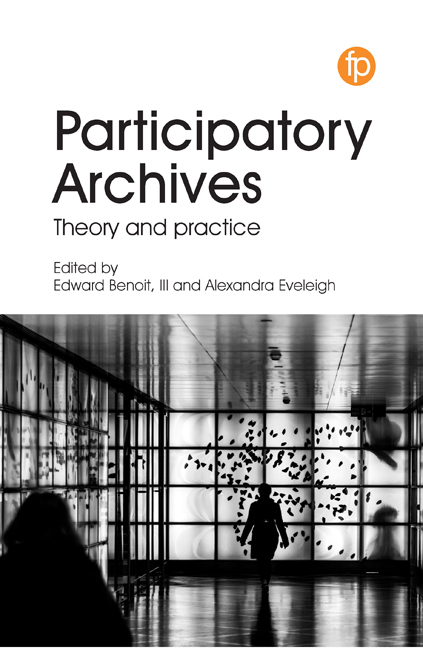Book contents
- Frontmatter
- Contents
- Figures and table
- Notes on contributors
- 1 Defining and framing participatory archives in archival science
- SECTION 1 SOCIAL TAGGING AND COMMENTING
- SECTION 2 TRANSCRIPTION
- SECTION 3 CROWDFUNDING AND OUTREACH
- 10 Kickstarting archives: crowdfunding and outreach in the digital age
- 11 Crowdfunding and the moral economies of community archival work
- 12 Acquiring equipment for obsolete media through crowdsourcing
- 13 Thinking outside the box: crowdfunding the Peter Mackay Archive
- SECTION 4 ALTERNATIVE AND ACTIVIST COMMUNITIES
- Notes
- Index
12 - Acquiring equipment for obsolete media through crowdsourcing
from SECTION 3 - CROWDFUNDING AND OUTREACH
Published online by Cambridge University Press: 25 October 2019
- Frontmatter
- Contents
- Figures and table
- Notes on contributors
- 1 Defining and framing participatory archives in archival science
- SECTION 1 SOCIAL TAGGING AND COMMENTING
- SECTION 2 TRANSCRIPTION
- SECTION 3 CROWDFUNDING AND OUTREACH
- 10 Kickstarting archives: crowdfunding and outreach in the digital age
- 11 Crowdfunding and the moral economies of community archival work
- 12 Acquiring equipment for obsolete media through crowdsourcing
- 13 Thinking outside the box: crowdfunding the Peter Mackay Archive
- SECTION 4 ALTERNATIVE AND ACTIVIST COMMUNITIES
- Notes
- Index
Summary
Many archivists are by now familiar with the challenges of extracting records from obsolete media. The field of digital forensics is an active and developing area of the archival community, through which archivists have experimented, tested and collaborated on methods of extracting and preserving content from obsolete media such as floppy disks, optical disks and vintage computers. However, between 2012 and 2014, Northwestern University Libraries staff began encountering a type of technological challenge rarely addressed in archival literature: archiving and preserving content from mobile devices. This challenge required us to turn to an unconventional solution: crowdsourcing. Although turning to the crowd was an untested strategy for the libraries, crowdsourcing allowed us to obtain some necessary equipment for extracting content from mobile devices and was a powerful tool for outreach, allowing us to raise awareness of our digital archiving programme at Northwestern, and promote participation in the archival process.
Background
By early 2015, Northwestern's University Archives acquired several cell phones, ranging from a mid-1990s Motorola to early-2010s smartphones. At first, these devices were treated as artefacts. However, so much of modern life is increasingly conducted on mobile devices such as cell phones and tablet computers, and many records that were previously collected in analogue forms – such as address books, photographs, and correspondence – are now being created and stored exclusively in mobile environments. The North - western University archivist expected that the archives would continue to acquire mobile devices in the future, and would need workflows and policies to extract and preserve these important archival records. The archival and digital curation staff developed procedures for transferring content from mobile devices. However, two significant barriers arose immediately before this workflow could be implemented. First, mobile devices like cell phones or tablet computers often require proprietary or obsolete peripheral equipment to transfer their contents; and second, methods of transferring data are highly device-dependent.
All of the cell phones acquired by Northwestern University Archives were orphaned, donated with no peripheral charging cords, data cables or other methods of copying their contents. None had any removable digital storage, and many had proprietary or obsolete ports, manufactured in the days before USB (Universal Serial Bus) connections became the standard.
- Type
- Chapter
- Information
- Participatory Archives , pp. 143 - 148Publisher: FacetPrint publication year: 2019



